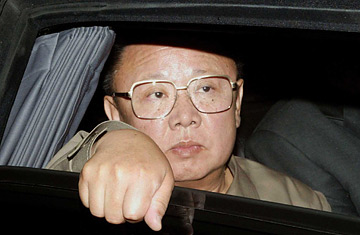
North Korean leader Kim Jong-il
In New York on March 4, U.S. and North Korean diplomats began discussing normalization of relations, while Treasury Department officials in Macau were in discussions aimed at allowing Banco Delta Asia to unfreeze North Korean accounts frozen at Washington's behest. (The accounts allegedly belong to high ranking North Korean officials involved in a variety of illicit businesses, including narcotics smuggling and the counterfeiting of United States currency.)
At a recent appearance in Washington, lead U.S. negotiator Christopher Hill was asked, facetiously, which was harder: negotiating with Pyongyang or within the Administration to get a "coherent" policy on North Korea. Hill laughed, but it was no joke. Those in the Administration who have argued for a strategy of engagement rather than isolation appear to be ascendant, particularly since the most recent round of Six-Party talks in Beijing on North Korea's nuclear weapons program. There, North Korea agreed to shut down its Yongbon nuclear reactor, which produces the fissile material for its nuclear weapons, in exchange for a variety of economic and diplomatic benefits. These included an emergency delivery of 50,000 tons of fuel oil to generate electricity, an end to the financial sanctions that had enraged Pyongyang's leadership, and the one-on-one discussions with the U.S. long demanded by North Korea but resisted by the Administration.
"Our [talks are] really an effort to address broad problems in the overall region, of which denuclearization is but one," Hill said, setting the goal as a general thaw in tensions in northeast Asia. The Six-Party agreement prescribes a step-by-step process to verifiably shut down Yongbyon, before the parties reconvene in Beijing to discuss further steps that would include dismantling the reactor. Hill acknowledges that progress towards a grand bargain depends entirely on small steps over the next few months. "It is unlikely that the North Koreans will roll out of bed in the morning and say we are going to make a strategic decision to get out of [the nuclear weapons business]," Hill said last month. "More likely, they are going to make decisions to move on a step-by-step basis. And as they move one step, they will look back and say, this is a better place than we were yesterday, and that will encourage them to take still another step."
At some point, presumably, those steps will raise the increasingly puzzling question of the North's other nuclear program, the one that allegedly makes bombs out of highly enriched uranium rather than plutonium. When the U.S. confronted Pyongyang in late 2002 with intelligence about this program, U.S. diplomats say Pyongyang confirmed its existence and then stormed out of the talks. Since then, the North has denied the existence of a uranium bomb program. And last week, a key intelligence official in Washington stunned a Senate panel by testifying that analysts now only had a "mid-confidence level" about the program's existence — down from the earlier "high confidence."
Proponents of the Bush Administration's more hawkish previous policy pounced, all but suggesting that the uranium program was being downplayed so as not to disrupt ongoing talks. John Bolton, former ambassador to the U.N., wrote that "there has been no suggestion that the original intelligence from 2002 has been contradicted or discredited" — which was true — and called on President Bush "sooner rather than later" to "tell us what he thinks about the intelligence, and the direction of his own [North Korea] policy."
Still, in a first-things-first process, the focus for now remains on getting the North to verifiably dismantle its existing reactor, which has allowed it to build the six to ten bombs the U.S. believes it has. Getting to the point where the alleged uranium program is the only stumbling block to a nuclear-free Korean peninsula would be, by itself, a significant diplomatic victory. But as Hill himself is the first to acknowledge, it's a long way from here to there.
— With reporting by Elaine Shannon/Washington
